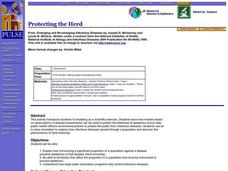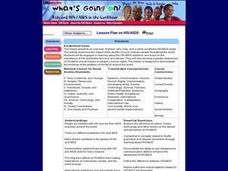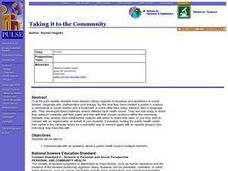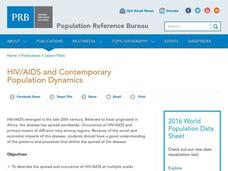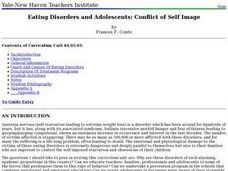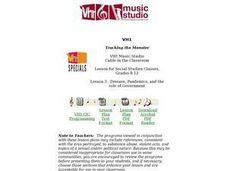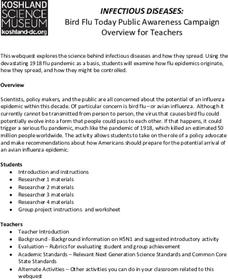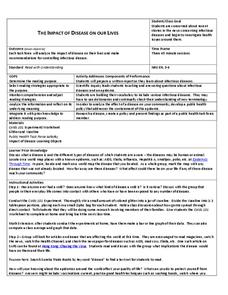Curated OER
Why Can’t I Have Sugar? All About Diabetes
Begin the lesson by having your class write what they know about diabetes. They learn through a skit how the body metabolizes glucose. A visual representation of the two types of diabetes is displayed, and then learners participate in...
Curated OER
Is Your Home Bugging You?
Students look into the world-wide rise in allergy rates. In this personal health lesson, students research and discuss possible reasons for the spike in allergies.
Curated OER
Protecting the Herd
High schoolers explain how immunizing a significant proportion of a population against a disease prevents epidemics of the disease (herd immunity). They list factors that affect the proportion of a population that must be immunized to...
Curated OER
Protecting the Herd
Students simulate the spread of a fictitious disease using an internet-based simulation. In this biology lesson, students predict the factors that could affect epidemic. They investigate these prediction using computer simulation.
Curated OER
Lesson Plan on HIV/AIDS
Students examine where, why, how and in what conditions HIV/AIDS exists. They examine the deadly impact this virus has had on the world and look at how to prevent the spread at home. The students also develop a greater awareness of the...
Alabama Department of Archives and History
A Worse Death: War or Flu?
In a lesson that integrates history and mathematics, class members create graphs that compare military death statistics from World War I with those that resulted from the influenza pandemic of 1918.
Curated OER
Taking it to the Community
Students communicate with an audience about a public health issue in multiple manners. They share their outreach materials with their peers and their chosen audience within the community.
Curated OER
Gazing Into the Faces of AIDS
Students consider whether or not there are generalizations that can be made about people who are infected with H.I.V. or who have the AIDS virus. They create public service ad campaigns to educate the public and consider other ways to...
Curated OER
HIV/AIDS, Friends & Families
Young scholars examine what it might feel like to test positive for HIV. They listen to a guest speaker, conduct a role-play activity, identify positive actions to take, and design a panel for the AIDS quilt project.
Curated OER
Obesity in Our World Today
Seventh graders investigate overeating and personal health by researching obesity facts. In this healthy eating lesson, 7th graders research the Internet for facts about youth obesity and the causes of ailments such as diabetes. Students...
Curated OER
HIV/AIDS and Contemporary Population Dynamics
Students describe the spread and occurrence of HIV/AIDS at multiple scales.
They explain global and regional variations in the occurrence of HIV/AIDS
and the spread of HIV/AIDS in the United States
Curated OER
Eating Disorders and Adolescents: Conflict of Self Image
Students study the complexities of eating disorders and the underlying factors which may contribute to their onset and development. They explore the various aspects and manifestations of these eating disorders and identify and...
Curated OER
Disease, Pandemics, and the Role of Government
Students compare and contrast the global efforts being made to stem a possible avian flu pandemic to the global efforts made to counter the current HIV/AIDS pandemic.
National Academy of Sciences
Infectious Diseases: Bird Flu Today
Understanding how viruses spread has never been more important. A well-designed WebQuest lesson has young scientists research viruses, how they spread, and how they are treated. They also consider the trends in common viruses in the world.
Curated OER
The Impact of Disease on Our Lives
Young scholars write a report about infectious diseases where they demonstrate their understanding of new terminology. In this writing activity, students analyze the effect of disease in their lives and and make scientific inquiry about...
Curated OER
Foodborne Illness Outbreak Investigation
Students demonstrate how epidemiological investigations of outbreaks are performed. They illustrate the principles of hypothesis formation and testing by epidemiologic study in the setting of an acute foodborne disease outbreak.
Curated OER
Infectious Disease Detectives
Learners participate in a simulation of how diseases are transmitted. Each student holds a test tube, with only one containing the "disease" while the others have water. They move around the room until told to stop. Using droppers to...
Baylor College
Calculating Exponential Growth
There can be a steep learning curve when teaching about exponential growth, but the lesson helps kids make sense out of the concept. When talking about exponential growth of viruses, learners may not be very interested, but when you are...
Baylor College
Modeling an HIV Particle
Models are an important part of science; they help us see the world on a scale that works for us. In the first of five lessons on HIV, learners make a paper model of the HIV virus that is about 500,000 times larger than the actual virus....
Baylor College
HIV/AIDS in the United States
In the final of five lessons about HIV/AIDS, groups create presentations to share data about the infection rates in the United States, examining demographic and geographic trends over the past ten years. Depending on how much time you...
Curated OER
The Cantankerous Pathogen
Students explore what factors influence the spread of infectious diseases. They explain how human manipulation of the environment affects the transmission of diseases.
Baylor College
Making Copies of an HIV Particle
In the second of five lessons about HIV, discover the mechanisms that allow the HIV virus to replicate. Using the models that they created the day before, learners examine the parts of the virus particle. The lesson plan does not say...
Curated OER
HIV/AIDS And Contemporary Population Dynamics
High schoolers describe the spread and occurence of HIV/AIDS at multiple scales. They explain global and regional variations in the occurence of HIV/AIDS and explain the spread of HIV/AIDS in the United States.
PBS
Pbs News Hour Extra: Tracking the Health Effects of Natural Disasters
Students examine the impact of natural disasters, such as flooding, on public health, and study diseases and other secondary conditions associated with stagnant water. Lesson includes resources for students to research epidemics and...




